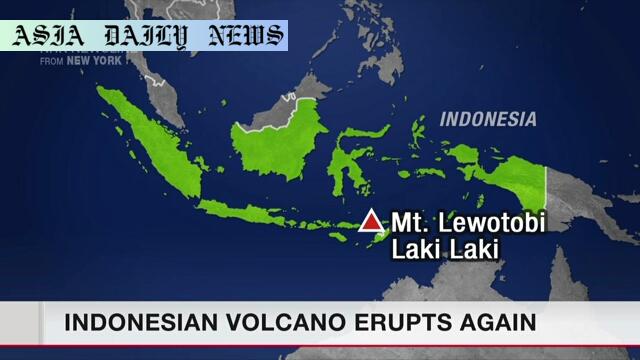Volcanic eruption prompts tsunami monitoring across Japan
Indonesia’s Mount Lewotobi Laki-laki volcano erupted, spewing ash 19 kilometers high.
The Japan Meteorological Agency is monitoring for tsunami, though no tidal changes have been detected.
Residents are urged to stay informed and follow further updates.

Massive Volcanic Eruption in Indonesia
In the early hours of Saturday morning, Mount Lewotobi Laki-laki in Indonesia erupted with tremendous force, spewing ash high into the atmosphere. Japanese officials recorded the plume extending roughly 19 kilometers above the volcano’s summit, signifying the eruption as one of significant magnitude. Such events can lead to various natural consequences, one of which is atmospheric pressure changes capable of triggering tsunami waves. This has raised concerns globally, particularly in regions such as Japan, known for its vulnerability to such disasters.
Monitoring Tsunami Risks
The Japan Meteorological Agency promptly issued a statement regarding the eruption, citing the potential risk of tsunami waves that could arise from atmospheric disturbances caused by the explosion. Preliminary estimates suggested that any resulting waves might have reached Okinawa Prefecture by 5:30 a.m. Japan time. Fortunately, as of 6 a.m., there have been no discernible changes in tidal levels at observation points within Japan or beyond its borders. Despite no immediate evidence of danger, authorities stress the importance of vigilance, urging individuals to stay informed and adhere to safety guidelines as conditions evolve.
Global Implications of the Eruption
The eruption of Mount Lewotobi Laki-laki serves as a stark reminder of the power of natural forces and their far-reaching implications. The potential for atmospheric pressure imbalances to cause tsunami waves highlights the interconnected nature of Earth’s systems. Additionally, volcanic eruptions of this magnitude can have lasting effects on surrounding ecosystems, climate, and air quality. Monitoring efforts extend beyond Japan, with global agencies keeping a close watch for any developments that might indicate broader impacts.
Preparedness and Public Awareness
Though no immediate danger has been identified, the situation highlights the importance of disaster preparedness and timely information dissemination. Emergency response teams across Japan and internationally remain alert as they continue to monitor the aftermath of the eruption. Public awareness campaigns play a crucial role in ensuring that communities are equipped with the knowledge to respond effectively to potential natural disasters. The eruption underscores the necessity of collaborative efforts among nations to address environmental threats.
Conclusion
While the eruption of Mount Lewotobi Laki-laki poses no immediate tidal threat to Japan, it underscores the ever-present need to respect and prepare for natural phenomena. It also serves as a reminder of the importance of state-of-the-art observation technology and multinational cooperation in addressing environmental calamities. As the world continues to monitor this event, it is a powerful testament to humanity’s resilience and ability to address and adapt to challenges from nature.
Commentary
The Power of Nature and Its Global Impact
The recent eruption of Mount Lewotobi Laki-laki in Indonesia offers yet another example of the unpredictable and awe-inspiring power of nature. Volcanic eruptions, while local in origin, can cause effects that ripple across continents, making them global events by their very nature. The ash eruption that reportedly reached 19 kilometers above the summit provides a vivid reminder of the sheer scale of these geological phenomena. It is a humbling experience for humanity, forcing societies to confront their vulnerability and rely on scientific expertise for safety and survival.
The Importance of Timely Monitoring
The Japan Meteorological Agency’s immediate response to the possibility of tsunami waves following the eruption was commendable. Their transparency regarding the risks and ongoing monitoring efforts highlights the crucial role of scientific organizations in preserving public safety. Natural disasters demand vigilance not only for their immediate consequences but also for the cascading impacts they might generate. The lack of significant tidal level changes thus far is reassuring for now, but it also demonstrates how technology and preparation can mitigate potential crises effectively.
A Plea for Global Cooperation
This eruption, while localized in Indonesia, has implications that extend far beyond. It is a powerful reminder of the need for international cooperation in addressing environmental threats. Institutions like meteorological agencies, geologists, and disaster management authorities must collaborate and share data effectively to ensure a unified response to such phenomena. Global interconnectedness means that events like these have ramifications beyond borders, and it is only through joint effort that humanity can prepare for and address similar future challenges effectively.
Conclusion: Learning from Nature
Ultimately, nature continues to teach humanity valuable lessons about strength, adaptability, and the importance of respecting the environment. While the Mount Lewotobi Laki-laki eruption is a reminder of potential dangers, it also highlights humanity’s capacity to learn, prepare, and respond. This moment is an opportunity to reinforce community safety efforts, enhance scientific research, and remind ourselves of the common bond shared by those living on this dynamic planet.


